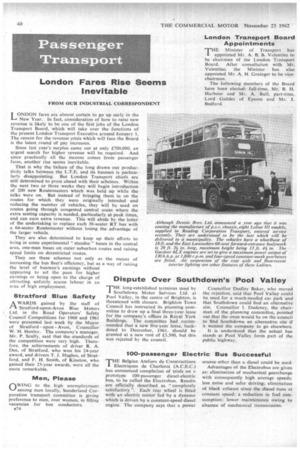London Fares Rise Seems Inevitable
Page 42

If you've noticed an error in this article please click here to report it so we can fix it.
LONDON fares are almost certain to go up early in the New Year. In fact, consideration of how to raise new revenue is likely to be one of the first jobs of the London Transport Board, which will take over the functions of the present London Transport Executive around January 1. The reason for the revenue crisis which will face the Board is the latest round of pay increases.
Since last years surplus came out at only £700.000, an urgent search for higher revenue will be required. And since practically all the income comes from passenger fares, another rise seems inevitable.
That is why the failure of the long drawn out productivity talks between the L.T.E. and its busmen is particularly disappointing. But London Transport chiefs are still determined to press ahead with their schemes. Within the next two or three weeks they will begin introduction of 200 new Routemasters which was held up while the talks were on. But instead of bringing them in on the routes for which they were originally intended and reducing the number of vehicles, they will be used on routes going through congested central areas where the extra seating capacity is needed, particularly at peak times, and can earn extra revenue. This will abide by the letter of the undertaking to replace each 56-seater RT bus with a 64-seater Routemaster without losing the advantage of the larger vehicle, They are also determined to keep up their efforts to bring in some experimental " standee" buses in the central area, one-man buses on outer suburban routes and raising speed limits on derestricted routes.
They see these schemes not only as the means of increasing the bus fleet's efficiency, but as a way of raising the level of busmen's earnings without appearing to set the pace for higher earnings or being open to the charge of attracting unfairly scarce labour in area of high employment. Although Dennis Bros. Ltd. announced a year ago that it was ceasing the manufacture of p.s.v, chassis, eight Loline III models, supplied to Reading Corporation Transport, entered service recently. They are understood to be the last which will be delivered to a municipality. The vehicles have a wheelbase of 18 ft. and the East Lancashire 68-Neat forward-entrance bodywork is 29 ft. 34 in. long, maximum height being 13 ft. 44 in. The Gardner 6LX engines are set to give a maximum power output of 130 b.h.p. at 1,600 r.p.m. and four-speed constant-mesh gearboxes are fitted. Air suspension of the rear axle and fluorescent interior lighting are other features of these Lobes.








































































































